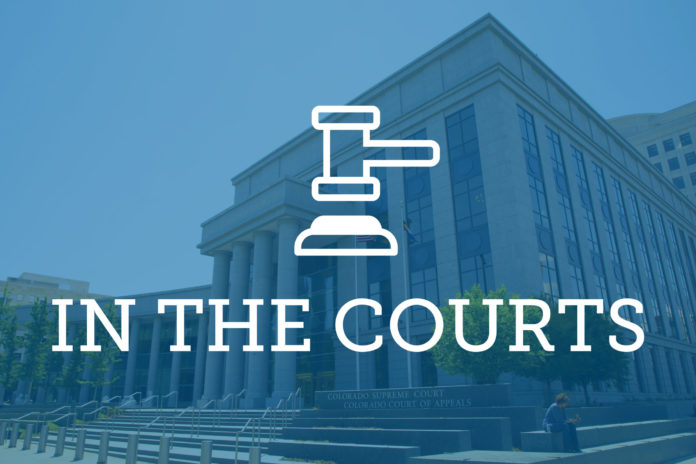
Editor’s Note: Law Week Colorado edits court opinion summaries for style and, when necessary, length.
This is an appeal of the district court’s dismissal of claims of malicious prosecution, abuse of process, false imprisonment and civil conspiracy brought by Daniel Wolf against Michael Brenneman and Jeffrey Selby. The district court dismissed most, but not all, of Wolf’s claims on the basis of absolute immunity and certified its dismissal order for immediate appeal under Colorado Rule of Civil Procedure 54(b).
A split division of the Colorado Court of Appeals, on July 28, 2022, dismissed this appeal. The division concluded that the district court’s C.R.C.P. 54(b) certification was ineffective to vest it with appellate jurisdiction.
After granting certiorari, the Colorado Supreme Court vacated the appeals court’s dismissal order. The Colorado Supreme Court directed the appeals court on remand to determine if it has appellate jurisdiction after applying the correct test for evaluating a C.R.C.P. 54(b) order.
After doing so, the appeals court concluded it had appellate jurisdiction.
As to the merits of this case, the appeals court held, as a matter of first impression, that witnesses enjoy absolute immunity from civil liability for their testimony to a grand jury, irrespective of whether a witness may be characterized as a “complaining witness.”
The appeals court found that the district court properly dismissed Wolf’s claims to the extent they are based on testimony Brenneman and Selby gave to the grand jury.
But the appeals court concluded the absolute immunity granted by the district court to Brenneman and Selby for statements they made to the DA in reporting Wolf’s alleged criminal activity was an error.
It also rejected any contention that Brenneman and Selby enjoy absolute immunity under the common law for their prior extrajudicial conduct.
The appeals court also held that grand jury witnesses are not entitled to absolute immunity for statements made to law enforcement before their grand jury testimony.
The appeals court affirmed the judgment to the extent the dismissal was based on grand jury testimony, reversed it to the extent the dismissal was based on communications by Brenneman and Selby to the district attorney and remanded the case for further proceedings.
Julian Vigil appealed the judgment of conviction entered after a jury found him guilty of attempted second-degree murder and second-degree assault.
Vigil argued that the trial court committed reversible error by admitting the testimony of two expert witnesses concerning the results of DNA and fingerprint analysis. According to Vigil, the experts authenticated the analyzed items through inadmissible hearsay testimony.
To perform their analyses, both the DNA analyst and the fingerprint examiner used samples supposedly obtained from Vigil—for the DNA analysis, buccal swabs purportedly containing Vigil’s cellular material, and for the fingerprint analysis, a fingerprint card bearing a name associated with Vigil generated from a fingerprint database.
According to the opinion, no one with personal knowledge testified about the source of the known samples.
Vigil contended that the known samples were never authenticated except through hearsay, rendering the experts’ testimony concerning “matches” inadmissible.
The Colorado Court of Appeals agreed.
The appeals court reversed and remanded for a new trial.
Michael Thomas Hupke appealed the judgment finding him guilty of attempting to influence a public servant.
Hupke contended that insufficient evidence supports his conviction because the language “by means of deceit” in Section 18-8-306 of the Colorado Revised Statutes requires an offender to personally deceive a public servant, and the prosecution presented no evidence that he personally deceived a public servant.
Hupke’s sufficiency argument raises a novel issue of statutory interpretation that required the Colorado Court of Appeals to decide whether a person can only be convicted of attempt to influence a public servant if they personally engage in the deception or whether such person can be convicted by using a third party to engage in that deception for them.
The appeals court held that the statute’s plain language doesn’t limit the offense to acts of deception personally committed by the offender as Hupke argued, but also includes deceptive acts that the offender engages a third party to commit on their behalf.
The appeals court affirmed.
Craig Hospital v. Blue Cross Blue Shield of Kansas
Craig Hospital appealed the district court’s determination that it lacked personal jurisdiction over Blue Cross Blue Shield of Kansas.
The Colorado Court of Appeals concluded that a nonresident insurer’s pre-approval and coverage of a nonresident’s health care in the forum, through BlueCard or a similar national health insurance program, doesn’t confer personal jurisdiction where the insurer didn’t initiate the request for out-of-state health care and didn’t otherwise direct activities toward the forum.
The appeals court affirmed.

